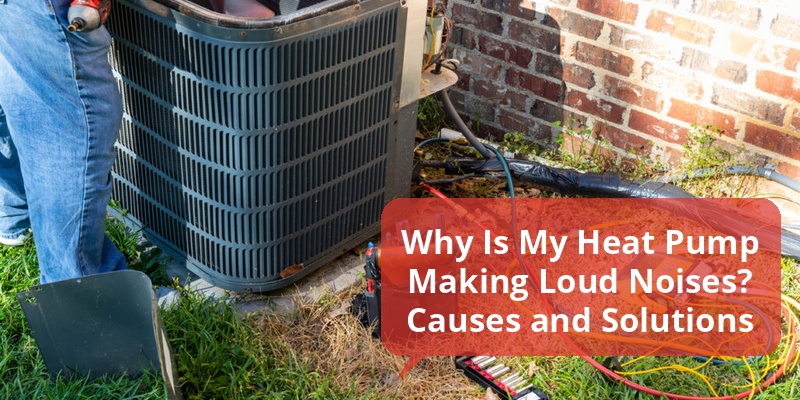Heat pumps are a popular and efficient heating and cooling solution for many American homes. However, when a heat pump becomes loud, it can be frustrating and concerning. Understanding the common causes of loud noises in heat pumps can help homeowners identify problems early and take appropriate action. This guide explores various reasons why your heat pump might be noisy and offers practical solutions to restore quiet operation.
| Noise Type | Possible Cause | Recommended Action |
|---|---|---|
| Rattling | Loose parts or debris | Tighten components, clear debris |
| Grinding or Screeching | Worn motor bearings or fan issues | Professional inspection and part replacement |
| Hissing or Whistling | Refrigerant leaks or airflow issues | Check refrigerant levels, clean filters |
| Buzzing | Electrical problems or compressor issues | Electrician or HVAC technician assessment |
| Clanking | Damaged fan blades or loose components | Repair or replace damaged parts |
Common Causes of Loud Noise in Heat Pumps
Heat pumps can generate various noises due to the mechanical and electrical components involved in their operation. Identifying the specific noise pattern is crucial to diagnosing the underlying cause.
Loose or Damaged Parts
Over time, screws, bolts, and panels in a heat pump may loosen because of vibration during operation. This often results in rattling or clanking sounds. Additionally, fan blades can become bent or damaged, producing loud noises when spinning.
Compressor and Motor Issues
The compressor and motor are key components. Worn-out bearings, lack of lubrication, or mechanical failure can generate grinding or screeching noises. These sounds typically indicate that immediate maintenance or replacement is necessary.
Refrigerant Leaks
A hissing or whistling noise may arise if there is a refrigerant leak. Low refrigerant levels can also cause the system to work harder, increasing overall noise and reducing efficiency.
Airflow Problems
Clogged or dirty air filters, blocked vents, or duct issues can produce buzzing or whistling sounds due to restricted airflow. Ensuring proper ventilation can reduce these noises and improve performance.
Electrical Issues
Buzzing or humming noises may originate from electrical components such as capacitors, contactors, or transformers. Faulty electrical parts require professional diagnosis to avoid hazards.
How to Troubleshoot and Fix a Loud Heat Pump
Before calling a professional, homeowners can perform some basic troubleshooting steps to determine and possibly fix the source of the noise.
Inspect and Clean the Unit
- Turn off the power to the heat pump before inspection.
- Remove any debris, leaves, or dirt around the outdoor unit.
- Check for loose screws, panels, or fan blades and tighten or adjust them.
- Clean or replace the air filters to ensure unrestricted airflow.
Listen for Specific Noises
Carefully listen to the type of noise. Persistent grinding or screeching often signals motor or compressor problems requiring professional repair.
Check the Refrigerant
Insufficient refrigerant causes inefficiency and noise. However, only licensed HVAC technicians should handle refrigerant refills or repairs due to legal and safety considerations.
Maintain Regular Servicing
Professional maintenance, including lubrication, inspection of electrical components, and system calibration, can prevent noise issues and prolong heat pump life.
When to Contact a Professional HVAC Technician
Some noise problems require expert attention to ensure the heat pump operates safely and effectively. Contact a technician if you experience:
- Grinding, screeching, or loud clanking sounds persist after basic maintenance.
- Buzzing noises accompanied by a burning smell or system failure.
- Hissing noises indicating potential refrigerant leaks.
- Unusual vibration or performance drops.
Professional inspections use specialized tools to diagnose internal damage or refrigerant issues that are not easily detectable by homeowners.
Preventing Noise Problems in Heat Pumps
Routine maintenance and mindful use can significantly reduce the risk of loud noises. Key prevention tips include:
- Clean the outdoor unit area regularly to avoid debris accumulation.
- Schedule annual professional maintenance checks.
- Replace filters every 1-3 months based on usage and environment.
- Ensure the heat pump is installed on a stable, vibration-absorbing base.
- Address minor noises early to prevent major damage.
Impact of Loud Heat Pumps on Home Comfort and Energy Efficiency
A noisy heat pump not only disturbs household peace but can indicate inefficiency. Excessive noise often correlates with increased energy consumption as the system works harder to provide heating or cooling. Early noise detection helps maintain system performance, optimize energy use, and reduce repair costs.
Choosing a Quiet Heat Pump for Your Home
If noise is a concern, selecting a heat pump model designed for quiet operation is advisable. Features to consider include:
- Variable speed compressors that reduce noise at lower loads.
- Sound blankets or insulation installed by manufacturers.
- Quality fan motors with balanced blades.
- Proper sizing and installation to minimize vibrations.
Consulting with HVAC professionals ensures the right equipment selection and installation for silent and efficient climate control.
